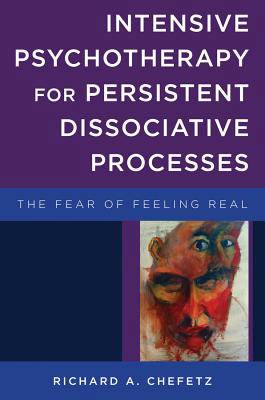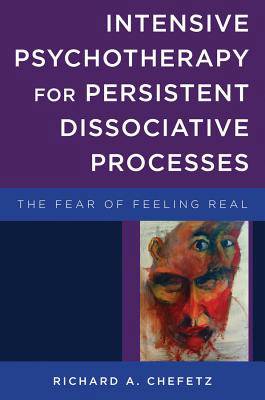
- Retrait gratuit dans votre magasin Club
- 7.000.000 titres dans notre catalogue
- Payer en toute sécurité
- Toujours un magasin près de chez vous
- Retrait gratuit dans votre magasin Club
- 7.000.0000 titres dans notre catalogue
- Payer en toute sécurité
- Toujours un magasin près de chez vous
Intensive Psychotherapy for Persistent Dissociative Processes
The Fear of Feeling Real
Richard A Chefetz
78,45 €
+ 156 points
Description
Dissociative processes have long burdened trauma survivors with the dilemma of longing to feel "real" at the same time as they desperately want to avoid the pain that comes with that healing--a dilemma that often presents particularly acute difficulties for healing professionals. Recent clinical and neurobiological research sheds some light into the dark corners of a mind undergoing persistent dissociation, but its integration into the practice of talking therapy has never, until now, been fully realized.
Intensive Psychotherapy for Persistent Dissociative Processes brings readers into the consultation room, and into the minds of both patient and therapist, like no other work on the treatment of trauma and dissociation. Richard A. Chefetz marries neuroscientific sophistication with a wealth of extended case histories, following patients over several years and offering several verbatim session transcripts. His unpacking of the emotionally impactful experience of psychodynamic talking therapy is masterfully written, clearly accessible, and singularly thorough.
From neurobiological foundations he builds a working understanding of dissociation and its clinical manifestations. Drawing on theories of self-states and their involvement in dissociative experiences, he demonstrates how to identify persistent dissociation and its related psychodynamic processes, including repetition compulsion and enactment. He then guides readers through the beginning stages of a treatment, with particular attention to the psychodynamics of emotion in both patient and therapist.
The second half of the book immerses readers in emotionally challenging clinical processes, offering insight into the neurobiology of fear and depersonalization, as well as case examples detailing struggles with histories of incest, sexual addiction, severe negativity, negative therapeutic reactions, enactment, and object-coercive doubting. The narrative style of Chefetz's casework is nearly novelistic, bringing to life the clinical setting and the struggles in both patient and therapist. The only mystery in this clinical exposition, as it explores several cases over a number of years, is what will happen next.
In the depth of his examples and in continual, self-reflexive analysis of flaws in past treatments, Chefetz is both a generous guide and an expert storyteller. Intensive Psychotherapy for Persistent Dissociative Processes is unique in its ability to place readers in the consultation room of psychodynamic therapy. With an evidence-focused approach based in neurobiology and a bold clinical scope, it will be indispensible to new and experienced therapists alike as they grapple with the most intractable clinical obstacles.
Intensive Psychotherapy for Persistent Dissociative Processes brings readers into the consultation room, and into the minds of both patient and therapist, like no other work on the treatment of trauma and dissociation. Richard A. Chefetz marries neuroscientific sophistication with a wealth of extended case histories, following patients over several years and offering several verbatim session transcripts. His unpacking of the emotionally impactful experience of psychodynamic talking therapy is masterfully written, clearly accessible, and singularly thorough.
From neurobiological foundations he builds a working understanding of dissociation and its clinical manifestations. Drawing on theories of self-states and their involvement in dissociative experiences, he demonstrates how to identify persistent dissociation and its related psychodynamic processes, including repetition compulsion and enactment. He then guides readers through the beginning stages of a treatment, with particular attention to the psychodynamics of emotion in both patient and therapist.
The second half of the book immerses readers in emotionally challenging clinical processes, offering insight into the neurobiology of fear and depersonalization, as well as case examples detailing struggles with histories of incest, sexual addiction, severe negativity, negative therapeutic reactions, enactment, and object-coercive doubting. The narrative style of Chefetz's casework is nearly novelistic, bringing to life the clinical setting and the struggles in both patient and therapist. The only mystery in this clinical exposition, as it explores several cases over a number of years, is what will happen next.
In the depth of his examples and in continual, self-reflexive analysis of flaws in past treatments, Chefetz is both a generous guide and an expert storyteller. Intensive Psychotherapy for Persistent Dissociative Processes is unique in its ability to place readers in the consultation room of psychodynamic therapy. With an evidence-focused approach based in neurobiology and a bold clinical scope, it will be indispensible to new and experienced therapists alike as they grapple with the most intractable clinical obstacles.
Spécifications
Parties prenantes
- Auteur(s) :
- Editeur:
Contenu
- Nombre de pages :
- 482
- Langue:
- Anglais
- Collection :
Caractéristiques
- EAN:
- 9780393707526
- Date de parution :
- 06-04-15
- Format:
- Livre relié
- Format numérique:
- Genaaid
- Dimensions :
- 165 mm x 239 mm
- Poids :
- 861 g

Les avis
Nous publions uniquement les avis qui respectent les conditions requises. Consultez nos conditions pour les avis.






